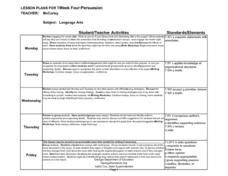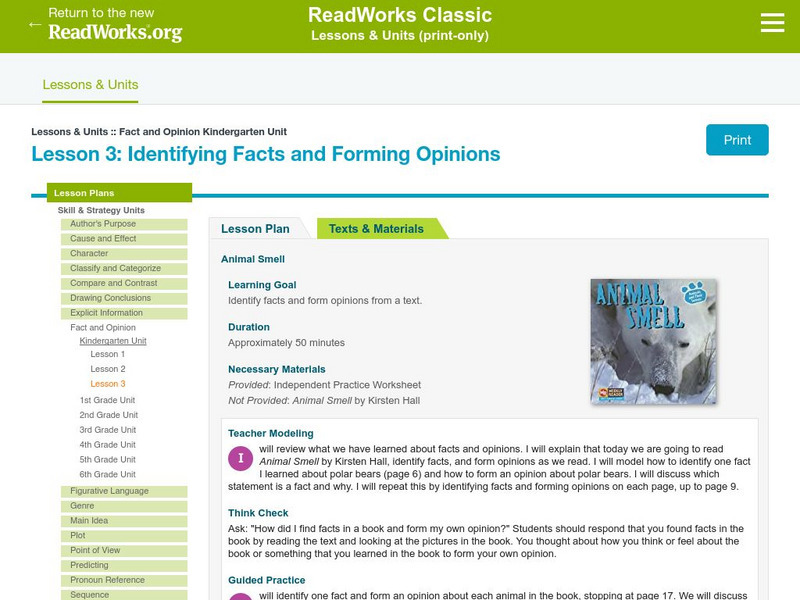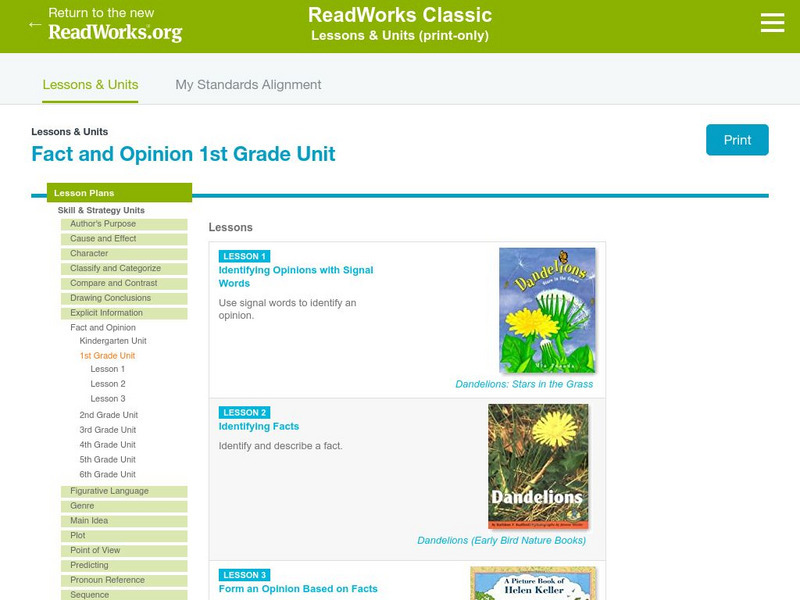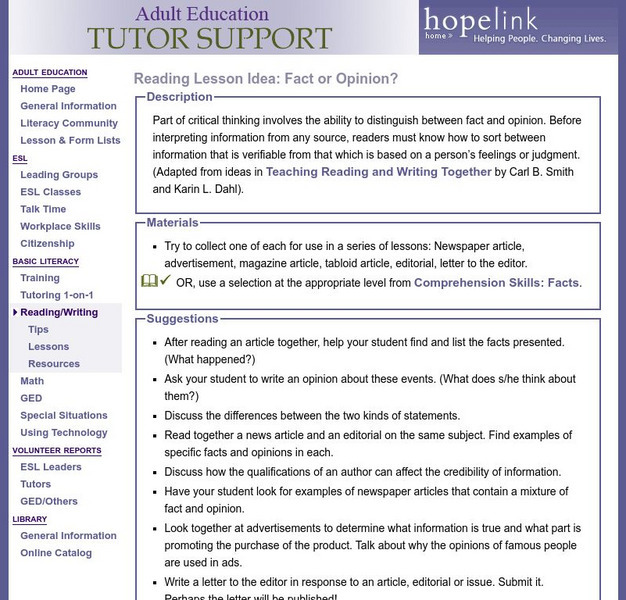Curated OER
Political Cartoons: Thinking Broadly, Communicating Succinctly
High schoolers think broadly about the tsunami disaster and its aftermath through studying cartoons. Students critically think about the literary devices the authors/artists use, such as satire, metaphor and personification.
Curated OER
Alaska's Cultures: Regions & Native Peoples of Alaska
Students read the essay "Did American Aborigines have Culture?". They discuss culture and what is meant by culture.
Curated OER
Quotable Women for Peace
Students read various quotes by women regarding violence, war, and peace. They analyze and discuss the quotes and participate in various writing and role-play activities.
Curated OER
The Font of Funniness
Students research the work of a contemporary humorist by analyzing a variety of pieces of their work. They look at the work from a variety of media sources such as writing, videos, and broadcasts to decide how "American" the material is....
Curated OER
Language Arts: Persuasion
Students examine the characteristics of persuasive writing. They identify arguments, supporting details, and discuss how to reorganize and present information in more effective ways. Students compose their own essays and discuss their...
Curated OER
Geography: Islands and Alcatraz
Pupils, in groups, create maps of islands including map keys and compass roses. They compare and contrast their island communities with that of the island prison, Alcatraz. Students select from a series of projects, including writing...
Curated OER
Holes
Learners watch the movie Holes. They list 5 key events from Holes and use a pyramid to rank the events in order of importance to the story. They determine cultural differences between the character and themselves.
Read Works
Read Works: Grade 2: Two Lesson Unit: Fact and Opinion
[Free Registration/Login Required] Designed to teach students to identify fact and opinion in a text. Lessons are based on the text "Dear Diary" and the book Penguins by Lynn M. Stone. Includes ideas for direct teaching, guided practice,...
Read Works
Read Works: Fourth Grade: Two Lesson Unit: Fact and Opinion
[Free Registration/Login Required] A two-lesson plan unit on fact and opinion through which students identify facts and opinions in a newspaper article and understand how facts support opinions in an editorial. With free login, users...
University of Illinois
University of Illinois Extension: Is It What I Think or What I Know? (Fact or Opinion)
This short lesson provides a fairly simple way to teach young students the difference between fact and opinion.
Florida Center for Reading Research
Florida Center for Reading Research: Text Analysis: Fact or Opinion Game [Pdf]
A lesson plan in which learners play a game where they move around a board by determining if statements are facts or opinions. Materials are included.
Florida Center for Reading Research
Florida Center for Reading Research: Text Analysis: Matter of Fact or Opinion [Pdf]
A lesson plan in which students work with a partner to write facts and opinions on different word cards. Materials are included.
Florida Center for Reading Research
Florida Center for Reading Research: Text Analysis: Fact or Opinion Football [Pdf]
A lesson plan in which students play a football card game by determining if sentences are facts or opinions. Materials are included.
University of Illinois
University of Illinois Extension: Is It What I Think or What I Know? (Fact or Opinion)
This short lesson provides a fairly simple way to teach young students the difference between fact and opinion.
Read Works
Read Works: Fact and Opinion Kindergarten Unit: Opinion
[Free Registration/Login Required] A lesson using Animal Touch by Kirsten Hall to teach students to form opinions based on information found within informational texts. Includes ideas for teaching, guided practice, and independent...
Read Works
Read Works: Fact/opinion Kindertarten Unit: Identifying Facts, Forming Opinions
[Free Registration/Login Required] A lesson using Animal Smell by Kirsten Hall to teach students to find factual information inside informational texts and begiE3229:E3236n to form opinions based on information within the text. Includes...
Read Works
Read Works: Fact and Opinion Kindergarten Unit: Fact
[Free Registration/Login Required] A lesson using Animal Touch by Kirsten Hall to teach students to find factual information inside informational texts. Includes ideas for teaching, guided practice, and independent practice. Although the...
Read Works
Read Works: Lessons: Lesson 3: Identifying Facts and Forming Opinions
[Free Registration/Login Required] A lesson plan and materials to teach kindergarten students identify facts and form opinions using the book Animal Smell.
Read Works
Read Works: Fact and Opinion 1st Grade Unit
[Free Registration/Login Required] A three-lesson unit on fact and opinion through which students learn how to identify opinions through signal words, identify facts in a non-fiction text, and use facts to help them formulate opinions of...
Read Works
Read Works: Fact and Opinion 3rd Grade Unit
[Free Registration/Login Required] A three-lesson unit on fact and opinion through which students learn how to identify facts and opinions in different fiction genres. Students also use non-fiction texts to identify and verify facts and...
Other
Grade 1 Informative Writing Lessons
Authored by the Tsehai Russell and Della Wright, CLR fellows, this resource provides a 5-day unit of informative writing lessons. Focus lessons related to facts and opinions and paragraph writing. This series is supported by the Academic...
Alabama Learning Exchange
Alex: Fact vs. Opinion
This instructional activity is a hands-on way for young scholars to learn how to discern between fact and opinion. This is an important skill for citizenship in that citizens should be informed about what is happening in their...
Hopelink
Hopelink: Reading Lesson Idea: Fact or Opinion?
In this lesson, students must learn to recognize the differences between fact and opinion.
Alabama Learning Exchange
Alex: Newspapers: Facts and Opinions
In order to sharpen a student's understanding of the differences between facts and opinions, this lesson incorporates both the close reading of a newspaper and the writing of a factual article and a letter to the editor.












![Florida Center for Reading Research: Text Analysis: Fact or Opinion Game [Pdf] Lesson Plan Florida Center for Reading Research: Text Analysis: Fact or Opinion Game [Pdf] Lesson Plan](https://content.lessonplanet.com/knovation/original/509095-73da26d30a9eaa9b2f5c24d21663aace.jpg?1661786981)
![Florida Center for Reading Research: Text Analysis: Matter of Fact or Opinion [Pdf] Lesson Plan Florida Center for Reading Research: Text Analysis: Matter of Fact or Opinion [Pdf] Lesson Plan](https://content.lessonplanet.com/knovation/original/509093-adc405a5910df5a982823c4579441be2.jpg?1661786984)
![Florida Center for Reading Research: Text Analysis: Fact or Opinion Football [Pdf] Lesson Plan Florida Center for Reading Research: Text Analysis: Fact or Opinion Football [Pdf] Lesson Plan](https://content.lessonplanet.com/knovation/original/509104-a8eda078a78bb5576ea4d58dd580df72.jpg?1661786968)










